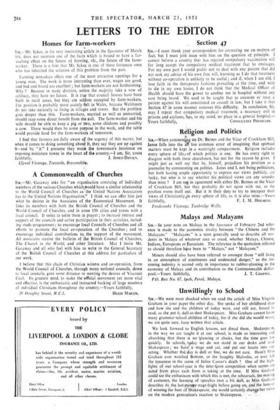LETTERS TO THE EDITOR Homes for Farm-workers SIR, —Mr. Sykes, in
his very interesting article in the Spectator of March 9th. does not mention one of the facts which is bound to have a far- .eaching effect on the future of farming, viz., the future of the farm- worker. There is a hint that Mr. Sykes is one of those fortunate ones who has inherited the solution of this problem from the past.
Farming nowadays offers one of the most attractive openings for a young man. The work is more interesting than ever, wages are good, and bed and board are excellent ; but farm-workers are not forthcoming. Why ? Because in many districts, unless the majority take a vow of celibacy, they have no future. It is trip that council houses have been built in rural areas, but they are seldom occupied by farm-workers. the position is probably more acutely-felt in Wales, because Welshmen do not take naturally to living in villages and towns. But the problem goes deeper than this. Farm-workers, married as well as unmarried, should reap some direct benefit from the soil. The farm-worker and his wife should be able to keep a pig or two, some chickens and possibly a cow. There would then be some purpose in the work, and the table would provide food for the farm-workers of tomorrow.
I find that farmers are 'fully aware oi the urgency of this matter, but when it comes to doing something about It, they say they are up against It—and by "it" I presume they mein the townsman's insistence on imposing miniature towns in the heart of the country.—I am, Sir, yours
faithfully, J. JONES-DAVIES. Llywel Vicarage, Trecastle, Breconshlre.


































 Previous page
Previous page